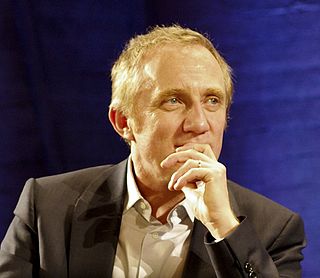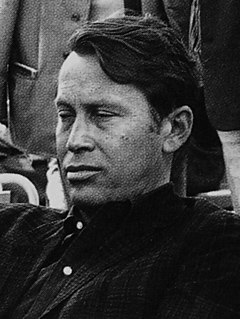A Quote by W. H. Auden
There is a certain kind of person who is so dominated by the desire to be loved for himself alone that he has constantly to test those around him by tiresome behavior; what he says and does must be admired, not because it is intrinsically admirable, but because it is his remark, his act. Does not this explain a good deal of avant-garde art?
Related Quotes
Those are the stakes that are constantly there and how do those stakes change you? How does that change the person you are? If it does just turn out to be about survival then is that living? How does that make you, you? How does that change your identity? That picture of the governor, his wife, and his daughter, he wasn't that guy before this all started. People dying around him changed him into that.
In order to institute action, it is not sufficient that the individual man have unachieved ends that he would like to fulfill. He must also expect that certain modes of behavior will enable him to attain his ends. A man may have a desire for sunshine, but if he realizes that he can do nothing to achieve it, he does not act on this desire.
A man's real faith is never contained in his creed, nor is his creed an article of his faith. The last is never adopted. This it is that permits him to smile ever, and to live even as bravely as he does. And yet he clings anxiously to his creed, as to a straw, thinking that that does him good service because his sheet anchor does not drag.
The fact that labour is external to the worker, i.e., it does not belong to his intrinsic nature; that in his work, therefore he does not affirm himself but denies himself, does not feel content but unhappy, does not develop freely his physical and mental energy but mortifies his body and his mind. The worker therefore only feels himself outside his work, and in his work feels outside himself.
Therefore, the truly great man, although he does not injure others, does not credit himself with charity and mercy (these are natural to him). He does not seek gain, but does not despise his followers who do. He struggles not for wealth, but does not take credit for leaving it alone... The ranks and emoluments of the world are to him no cause for joy, it's punishments and shame no cause for disgrace.
Trump has a mind that in many ways is always under duress, because he's always seeking to be accepted, loved. He sees himself as constantly victimized by others and by the society, from which he sees himself as fighting back. So there's always an intensity to his destructive behavior that could contribute to his false beliefs.
A man follows the path laid out for him. He does his duty to God and his King. He does what he must do, not what pleases him. God's truth, boy, what kind of world would this be if every man did what pleased him alone? Who would plough the fields and reap the harvest, if every man had the right to say, 'I don't want to do that.' In this world there is a place for every man, but every man must know his place.
[S]uppose the mind of [a] friend of humanity were clouded over with his own grief, extinguishing all sympathetic participation in the fate of others; he still has the resources to be beneficent to those suffering distress, but the distress of others does not touch him because he is sufficiently busy with his own; and now, where no inclination any longer stimulates him to it, he tears himself out of his deadly insensibility and does the action without any inclination, solely from duty.







































